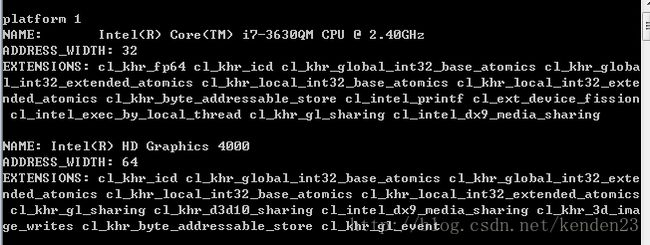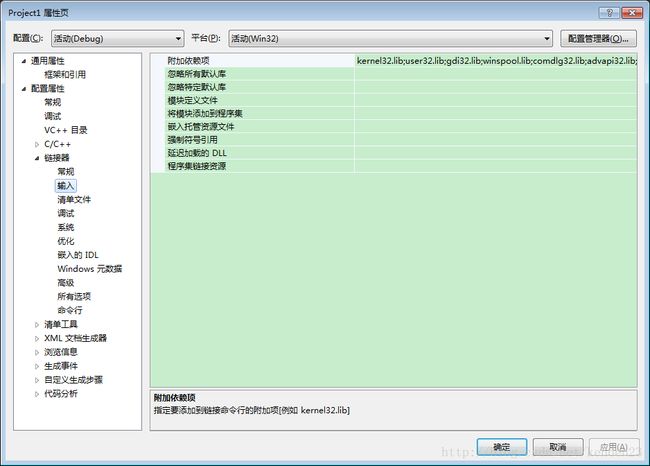详细程序注解学OpenCL一 环境配置和入门程序
本专栏是通过注解程序的方法学习OpenCL,我觉得一个一个地去抠原理也不是办法,干脆直接学习程序,然后把相关原理都直接注解到程序语句当中。
原创地址:http://blog.csdn.net/kenden23/article/details/14101657
一开始要配置好环境,我的是nvidia,所以就按照我的电脑举例,AMD应该也差不多。
1. 首先要到nvidia网站下载适合你显卡的最新驱动,安装好
2. 还是在nvidia网站下载好CUDA开发包,安装好
3. 如果默认安装路径的话,路径应该是在:C:\Program Files\NVIDIA GPU Computing Toolkit\CUDA\v5.0
4. 打开这个目录会发现里面有include和lib文件夹,这就是我们需要配置在visual studio中的文件
5. 打开visual studio(版本基本都无关系,我用的是vs2012),新建一个win32空项目。按下alt+F7打开项目属性,也可以点击项目文件右键,选择属性。
6. 在属性页里面找到“C/C++”的“常规”项,点击,右边有“附加包含目录”,然后编辑,添加目录:C:\Program Files\NVIDIA GPU Computing Toolkit\CUDA\v5.0\include
7.在属性页里面找到“连接器”,点击其“常规”项,右边有“附加库目录”,然后也是编辑,添加目录:C:\Program Files\NVIDIA GPU Computing Toolkit\CUDA\v5.0\lib\Win32,如果是64位系统可以是:C:\Program Files\NVIDIA GPU Computing Toolkit\CUDA\v5.0\lib\x64。
8. 在属性页里找到“常规”项, 右边“附加依赖项”,编辑,添加lib文件:OpenCL.lib
9. 然后就可以新建源文件,在源文件里面添加相关的OpenCl程序,就可以调试OpenCL程序了。
下面就可以开始学习程序了。
下面是个入门程序,已经注释好了,注释包括了基本原理的解析,可以通过直接阅读和调试程序学习OpenCL了。
本程序是读取电脑中的支持OpenCL的硬件nvidia和intel和AMD等信息,然后显示在屏幕上。
- #include
- #include
- #include
- #include
- #ifdef MAC
- #include
- #else
- #include
- #endif
- int main() {
- /* Host data structures */
- cl_platform_id *platforms;
- //每一个cl_platform_id 结构表示一个在主机上的OpenCL执行平台,就是指电脑中支持OpenCL的硬件,如nvidia显卡,intel CPU和显卡,AMD显卡和CPU等
- cl_uint num_platforms;
- cl_int i, err, platform_index = -1;
- /* Extension data */
- char* ext_data;
- size_t ext_size;
- const char icd_ext[] = "cl_khr_icd";
- //要使platform工作,需要两个步骤。1 需要为cl_platform_id结构分配内存空间。2 需要调用clGetPlatformIDs初始化这些数据结构。一般还需要步骤0:询问主机上有多少platforms
- /* Find number of platforms */
- //返回值如果为-1就说明调用函数失败,如果为0标明成功
- //第二个参数为NULL代表要咨询主机上有多少个platform,并使用num_platforms取得实际flatform数量。
- //第一个参数为1,代表我们需要取最多1个platform。可以改为任意大如:INT_MAX整数最大值。但是据说0,否则会报错,实际测试好像不会报错。下面是步骤0:询问主机有多少platforms
- err = clGetPlatformIDs(5, NULL, &num_platforms);
- if(err < 0) {
- perror("Couldn't find any platforms.");
- exit(1);
- }
- printf("I have platforms: %d\n", num_platforms); //本人计算机上显示为2,有intel和nvidia两个平台
- /* Access all installed platforms */
- //步骤1 创建cl_platform_id,并分配空间
- platforms = (cl_platform_id*)
- malloc(sizeof(cl_platform_id) * num_platforms);
- //步骤2 第二个参数用指针platforms存储platform
- clGetPlatformIDs(num_platforms, platforms, NULL);
- /* Find extensions of all platforms */
- //获取额外的平台信息。上面已经取得了平台id了,那么就可以进一步获取更加详细的信息了。
- //一个for循环获取所有的主机上的platforms信息
- for(i=0; i
- {
- /* Find size of extension data */
- //也是和前面一样,先设置第三和第四个参数为0和NULL,然后就可以用第五个参数ext_size获取额外信息的长度了。
- err = clGetPlatformInfo(platforms[i],
- CL_PLATFORM_EXTENSIONS, 0, NULL, &ext_size);
- if(err < 0)
- {
- perror("Couldn't read extension data.");
- exit(1);
- }
- printf("The size of extension data is: %d\n", ext_size);//我的计算机显示224.
- /* Access extension data */
- //这里的ext_data相当于一个缓存,存储相关信息。
- ext_data = (char*)malloc(ext_size);
- //这个函数就是获取相关信息的函数,第二个参数指明了需要什么样的信息,如这里的CL_PLATFORM_EXTENSIONS表示是opencl支持的扩展功能信息。我计算机输出一大串,机器比较新(专门为了学图形学而购置的电脑),支持的东西比较多。
- clGetPlatformInfo(platforms[i], CL_PLATFORM_EXTENSIONS,
- ext_size, ext_data, NULL);
- printf("Platform %d supports extensions: %s\n", i, ext_data);
- //这里是输出生产商的名字,比如我显卡信息是:NVIDIA CUDA
- char *name = (char*)malloc(ext_size);
- clGetPlatformInfo(platforms[i], CL_PLATFORM_NAME,
- ext_size, name, NULL);
- printf("Platform %d name: %s\n", i, name);
- //这里是供应商信息,我显卡信息:NVIDIA Corporation
- char *vendor = (char*)malloc(ext_size);
- clGetPlatformInfo(platforms[i], CL_PLATFORM_VENDOR,
- ext_size, vendor, NULL);
- printf("Platform %d vendor: %s\n", i, vendor);
- //最高支持的OpenCL版本,本机显示:OpenCL1.1 CUDA 4.2.1
- char *version = (char*)malloc(ext_size);
- clGetPlatformInfo(platforms[i], CL_PLATFORM_VERSION,
- ext_size, version, NULL);
- printf("Platform %d version: %s\n", i, version);
- //这个只有两个值:full profile 和 embeded profile
- char *profile = (char*)malloc(ext_size);
- clGetPlatformInfo(platforms[i], CL_PLATFORM_PROFILE,
- ext_size, profile, NULL);
- printf("Platform %d full profile or embeded profile?: %s\n", i, profile);
- /* Look for ICD extension */
- //如果支持ICD这一扩展功能的platform,输出显示,本机的Intel和Nvidia都支持这一扩展功能
- if(strstr(ext_data, icd_ext) != NULL)
- platform_index = i;
- std::cout<<"Platform_index = "<
- /* Display whether ICD extension is supported */
- if(platform_index > -1)
- printf("Platform %d supports the %s extension.\n",
- platform_index, icd_ext);
- std::cout<
- //释放空间
- free(ext_data);
- free(name);
- free(vendor);
- free(version);
- free(profile);
- }
- if(platform_index <= -1)
- printf("No platforms support the %s extension.\n", icd_ext);
- /* Deallocate resources */
- free(platforms);
- return 0;
- }
每个电脑的输出结果不一样的,我电脑的输出结果是:
OpenCL 查看设备信息
下面是注释程序,目的就是查看自己计算机上所有支持OpenCL的设备,并打印信息。
主函数调用run()就可以运行了。要设置请看我另一篇OpenCl设置文章。
- #include
- #include
- #include
- #ifdef MAC
- #include
- #else
- #include
- #endif
- namespace device_ext_test
- {
- int run() {
- /* Host/device data structures */
- cl_platform_id *platforms;
- cl_device_id *devices;
- cl_uint num_platforms;
- cl_uint num_devices, addr_data;
- cl_int i, err;
- /* Extension data */
- char name_data[48], ext_data[4096];
- err = clGetPlatformIDs(5, NULL, &num_platforms);
- if(err < 0) {
- perror("Couldn't find any platforms.");
- exit(1);
- }
- /* 选取所有的platforms*/
- platforms = (cl_platform_id*)
- malloc(sizeof(cl_platform_id) * num_platforms);
- err = clGetPlatformIDs(num_platforms, platforms, NULL);
- if(err < 0) {
- perror("Couldn't find any platforms");
- exit(1);
- }
- //循环查看所有platforms的devices信息,一般intel和AMD的都可以有两个devices:CPU和显卡
- //如果是nvidia的就一般只有一个显卡device了。
- for (int j = 0; j < (int)num_platforms; j++)
- {
- printf("\nplatform %d\n", j+1);
- /* 步骤和platforms的一样 */
- err = clGetDeviceIDs(platforms[j], CL_DEVICE_TYPE_ALL, 1, NULL, &num_devices);
- if(err < 0) {
- perror("Couldn't find any devices");
- exit(1);
- }
- /* Access connected devices */
- devices = (cl_device_id*)
- malloc(sizeof(cl_device_id) * num_devices);
- clGetDeviceIDs(platforms[j], CL_DEVICE_TYPE_ALL,
- num_devices, devices, NULL);
- /*循环显示platform的所有device(CPU和显卡)信息。*/
- for(i=0; i<(int)num_devices; i++) {
- err = clGetDeviceInfo(devices[i], CL_DEVICE_NAME,
- sizeof(name_data), name_data, NULL);
- if(err < 0) {
- perror("Couldn't read extension data");
- exit(1);
- }
- clGetDeviceInfo(devices[i], CL_DEVICE_ADDRESS_BITS,
- sizeof(ext_data), &addr_data, NULL);
- clGetDeviceInfo(devices[i], CL_DEVICE_EXTENSIONS,
- sizeof(ext_data), ext_data, NULL);
- printf("NAME: %s\nADDRESS_WIDTH: %u\nEXTENSIONS: %s\n\n",
- name_data, addr_data, ext_data);
- }
- }
- free(platforms);
- free(devices);
- printf("\n");
- system("pause");
- return 0;
- }
- }

OpenCL 操作context
本程序主要测试:
context = clCreateContext(NULL, 1, &device, NULL, NULL, &err);
创建一个context
clRetainContext(context);//Context的reference +1
clReleaseContext(context);//Context的reference -1
- #include
- #include
- #include
- #ifdef MAC
- #include
- #else
- #include
- #endif
- namespace context_count
- {
- int run()
- {
- cl_platform_id platform;
- cl_device_id device;
- cl_context context;
- cl_int err;
- cl_uint ref_count;
- err = clGetPlatformIDs(1, &platform, NULL);
- if(err < 0) {
- perror("Couldn't find any platforms");
- exit(1);
- }
- err = clGetDeviceIDs(platform, CL_DEVICE_TYPE_GPU, 1, &device, NULL);
- if(err == CL_DEVICE_NOT_FOUND) {
- err = clGetDeviceIDs(platform, CL_DEVICE_TYPE_CPU, 1, &device, NULL);
- }
- if(err < 0) {
- perror("Couldn't find any devices");
- exit(1);
- }
- /* 创建 context */
- context = clCreateContext(NULL, 1, &device, NULL, NULL, &err);
- if(err < 0) {
- perror("Couldn't create a context");
- exit(1);
- }
- /* 获取reference count的数量,使用ref_count返回值*/
- err = clGetContextInfo(context, CL_CONTEXT_REFERENCE_COUNT,
- sizeof(ref_count), &ref_count, NULL);
- if(err < 0) {
- perror("Couldn't read the reference count.");
- exit(1);
- }
- printf("Initial reference count: %u\n", ref_count);
- /* 每次函数访问context的时候,调用clRetainContext,就是把context reference + 1,因为context并不是像platform和device那样delete的,而是clRetainContext的时候+1,当调用clReleaseContext的时候-1,当为零的时候,系统自动删除context。这就可以方便cl_context数据存活超过创建它的函数,可以让第三方库什么的继续访问context */
- clRetainContext(context);clRetainContext(context);
- clGetContextInfo(context, CL_CONTEXT_REFERENCE_COUNT,
- sizeof(ref_count), &ref_count, NULL);
- printf("Reference count: %u\n", ref_count);
- clReleaseContext(context);
- clGetContextInfo(context, CL_CONTEXT_REFERENCE_COUNT,
- sizeof(ref_count), &ref_count, NULL);
- printf("Reference count: %u\n", ref_count);
- clReleaseContext(context);clReleaseContext(context);
- system("pause");
- return 0;
- }
- }

OpenCL 获取Program信息
本程序生成一个OpenCL Program,然后获取Program的source,其实它的source就是一个char[],可以打印出来。
然后我们把这些内容和原来文本的内容对比,看看是否是我们想要读入的内容。
还可以测试是否编译正确,如果不正确会有输出提示的。
下面程序运行如下:
前面都是读入的函数代码。然后后面检查这些函数是否正确,可以看到第二个函数不正确,因为*r没有定义。
下面是完整代码:
- #define _CRT_SECURE_NO_WARNINGS
- #include
- #include
- #include
- #ifdef MAC
- #include
- #else
- #include
- #endif
- namespace program_build
- {
- const static int NUM_FILES = 2;
- const char PROGRAM_FILE_1[] = "good.cl";
- const char *PROGRAM_FILE_2 = "bad.cl";
- int run()
- {
- /*program可以包括多个kernel,一个kernel相当于一个功能函数,由program包含在内存中,然后就可以使用kernel的功能了。
- 1 需要使用kernel,创建program,把kernel读入内存
- 2 需要把program和device连接起来
- Host/device data structures */
- cl_platform_id platform;
- cl_device_id device;
- cl_context context;
- cl_int i, err;
- /* Program data structures */
- cl_program program;
- FILE *program_handle;
- char *program_buffer[NUM_FILES];
- char *program_log;
- const char *file_name[] = {PROGRAM_FILE_1, PROGRAM_FILE_2};
- const char options[] = "-cl-finite-math-only -cl-no-signed-zeros";
- size_t program_size[NUM_FILES];
- size_t log_size;
- /* Access the first installed platform */
- err = clGetPlatformIDs(1, &platform, NULL);
- if(err < 0) {
- perror("Couldn't find any platforms");
- exit(1);
- }
- /* Access the first GPU/CPU */
- err = clGetDeviceIDs(platform, CL_DEVICE_TYPE_GPU, 1, &device, NULL);
- if(err == CL_DEVICE_NOT_FOUND) {
- err = clGetDeviceIDs(platform, CL_DEVICE_TYPE_CPU, 1, &device, NULL);
- }
- if(err < 0) {
- perror("Couldn't find any devices");
- exit(1);
- }
- /* Create a context */
- context = clCreateContext(NULL, 1, &device, NULL, NULL, &err);
- if(err < 0) {
- perror("Couldn't create a context");
- exit(1);
- }
- /* Read each program file and place content into buffer array */
- for(i=0; i
- program_handle = fopen(file_name[i], "r");
- if(program_handle == NULL) {
- perror("Couldn't find the program file");
- exit(1);
- }
- fseek(program_handle, 0, SEEK_END);
- program_size[i] = ftell(program_handle);
- rewind(program_handle);
- program_buffer[i] = (char*)malloc(program_size[i]+1);
- program_buffer[i][program_size[i]] = '\0';
- fread(program_buffer[i], sizeof(char), program_size[i],
- program_handle);
- fclose(program_handle);
- }
- /* Create a program containing all program content */
- program = clCreateProgramWithSource(context, NUM_FILES,
- (const char**)program_buffer, program_size, &err);
- if(err < 0) {
- perror("Couldn't create the program");
- exit(1);
- }
- /* Build program
- but one provision is crucial: every compiler must be accessible through clBuild-Program. This function compiles and links a cl_program for devices associated with the platform. It doesn’t return a new cl_program, but instead modifies the input data structure.
- */
- err = clBuildProgram(program, 1, &device, options, NULL, NULL);
- int bufSize = program_size[0] + program_size[1] + 1;
- char *programBuffer = (char *) malloc(bufSize);
- clGetProgramInfo(program, CL_PROGRAM_SOURCE, bufSize, programBuffer, NULL);
- printf("Print Program Source:\n");
- printf("\n %s \n", programBuffer);
- printf("Check if it is correct:\n");
- for (int i = 0; i < NUM_FILES; i++)
- {
- printf("\n %s \n", program_buffer[i]);
- }
- if(err < 0)
- {
- clGetProgramBuildInfo(program, device, CL_PROGRAM_BUILD_LOG,
- 0, NULL, &log_size);
- program_log = (char*) malloc(log_size+1);
- program_log[log_size] = '\0';
- clGetProgramBuildInfo(program, device, CL_PROGRAM_BUILD_LOG,
- log_size+1, program_log, NULL);
- printf("%s\n", program_log);
- free(program_log);
- system("pause");
- exit(1);
- }
- /* Deallocate resources */
- for(i=0; i
- free(program_buffer[i]);
- }
- clReleaseProgram(program);
- clReleaseContext(context);
- system("pause");
- return 0;
- }
- }


